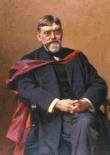The literary scholar and critic, Mungo William MacCallum, arrived in Australia in 1887 after being selected by a committee to a new chair of modern language and literature at the University of Sydney; after his retirement in 1920 he successively held various positions at the university including that of Vice-Chancellor (1924-1928). Although MacCallum 'found his colonial appointment some hindrance to his scholarly endeavours', his presence was 'enormously influential' on the 'intellectual and cultural life' of New South Wales. In this capacity, he not only contributed to the University of Sydney, where he 'developed the tradition of Elizabethan scholarship' in the English department, but was also actively involved in the wider community holding such positions as chairman of trustees of the Public Library of New South Wales from 1906-1912. Notably, it was during this period that the Mitchell Library opened in 1910.
Described as a 'man of massive learning', MacCallum established an 'international reputation' in English studies with works such as the major study, Tennyson's Idylls of the King and Arthurian Story from the XVIth Century (1894), and his expository, Shakespeare's Roman Plays and Their Background (1910). In addition to literary criticism, MacCallum's publications include the short biography, In memory of Albert Bythesea Weigall (1913), and a biblical verse drama, Queen Jezebel : Fragments of an Imaginary Biography in Dramatised Dialogue (1930).
Knighted in 1926 for his services to education, MacCallum was also appointed Emeritus Professor at the University of Sydney and honoured by doctorates from the universities of Glasgow and Oxford. Further acknowledging his distinguished career, Southerly marked the second anniversary of MacCallum's death by issuing a special 'MacCallum Memorial Number' in September 1944.
Mungo William MacCallum was the father of Mungo Lorenz MacCallum, the grandfather of Mungo (Ballardie) MacCallum, and the great-grandfather of Mungo (Wentworth) MacCallum.
 4877641647001714692.jpg
4877641647001714692.jpg